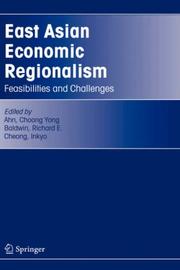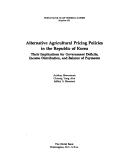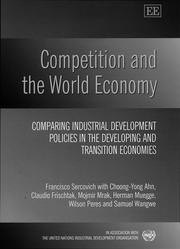| Listing 1 - 7 of 7 |
Sort by
|
Book
Abstract | Keywords | Export | Availability | Bookmark
 Loading...
Loading...Choose an application
- Reference Manager
- EndNote
- RefWorks (Direct export to RefWorks)
Book
Abstract | Keywords | Export | Availability | Bookmark
 Loading...
Loading...Choose an application
- Reference Manager
- EndNote
- RefWorks (Direct export to RefWorks)

ISBN: 1280461055 9786610461059 0387243313 0387243305 1441937218 9780387243306 Year: 2005 Publisher: Dordrecht Springer
Abstract | Keywords | Export | Availability | Bookmark
 Loading...
Loading...Choose an application
- Reference Manager
- EndNote
- RefWorks (Direct export to RefWorks)
Economic regionalism has become a worldwide phenomenon. Since the Asian financial crisis, East Asian countries are accelerating the ongoing market-driven economic integration as well as institutional economic integration. The question is whether East Asia can reach an East Asian FTA (EAFTA), which is the first step towards institutional economic integration. East Asian Economic Regionalism attempts to analyze the feasibilities of economic integration in East Asia and to discuss emerging economic integration efforts in East Asia with special reference to an East Asian FTA. Although economic integration is desirable economically, positions and approaches of each regional economy toward East Asian economic integration may differ depending on the circumstances of the countries concerned. East Asian Economic Regionalism provides diverse positions on East Asian economic integration by ASEAN countries, as well as the Northeastern countries of China, Japan and Korea. The volume also provides economic assessment of EAFTA and evaluates East Asian economic integration. East Asian Economic Regionalism may be the first book on East Asian economic integration with positions toward economic integration of major players in the region.
Regionalism --- East Asia --- Economic integration. --- Foreign trade policy --- International economic relations --- Development economics. --- International economics. --- Economic growth. --- Economic theory. --- Development Economics. --- International Economics. --- Economic Growth. --- Economic Theory/Quantitative Economics/Mathematical Methods. --- Economic theory --- Political economy --- Social sciences --- Economic man --- Development, Economic --- Economic growth --- Growth, Economic --- Economic policy --- Economics --- Statics and dynamics (Social sciences) --- Development economics --- Resource curse --- Economic policy, Foreign --- Economic relations, Foreign --- Economics, International --- Foreign economic policy --- Foreign economic relations --- Interdependence of nations --- International economic policy --- International economics --- New international economic order --- International relations --- Economic sanctions --- Economic development --- 5.300.

ISBN: 0821302752 Year: 1983 Publisher: Washington (D.C.) World Bank
Abstract | Keywords | Export | Availability | Bookmark
 Loading...
Loading...Choose an application
- Reference Manager
- EndNote
- RefWorks (Direct export to RefWorks)
Balance of payments --- Barley --- Debts, Public --- Finance, Public --- Income distribution --- Rice --- 338.722.6 --- KR / South Korea - Zuid Korea - Corée du Sud --- 338.53 --- 631.15 --- 338.53 Overheidsinvloed op prijsvorming. Prijzenpolitiek van de overheid --- Overheidsinvloed op prijsvorming. Prijzenpolitiek van de overheid --- 631.15 Farm production. Farm management. Farm administration --- Farm production. Farm management. Farm administration --- Lowland paddy --- Lowland rice --- Oryza sativa --- Paddy (Plant) --- Padi --- Palay --- Oryza --- Debts, Government --- Government debts --- National debts --- Public debt --- Public debts --- Sovereign debt --- Debt --- Bonds --- Deficit financing --- Hordeum sativum --- Hordeum vulgare --- Nepal barley --- Hordeum --- Current account balance (International trade) --- International payments, Balance of --- Foreign exchange --- Terms of trade --- Balance of trade --- International liquidity --- Prices --- Landbouwprijzen --- Zonder onderwerpscode
Digital
ISBN: 9780387243313 Year: 2005 Publisher: Boston, MA Springer
Abstract | Keywords | Export | Availability | Bookmark
 Loading...
Loading...Choose an application
- Reference Manager
- EndNote
- RefWorks (Direct export to RefWorks)
Economic growth --- Economic schools --- Foreign trade. International trade --- wereldeconomie --- economische groei --- economisch denken --- internationale economie

ISBN: 1840641924 Year: 1999 Publisher: Cheltenham Elgar
Abstract | Keywords | Export | Availability | Bookmark
 Loading...
Loading...Choose an application
- Reference Manager
- EndNote
- RefWorks (Direct export to RefWorks)
Economic policy and planning (general) --- Industrial economics --- Trade theory --- Developing countries --- Eastern and Central Europe
Book
ISBN: 9780387243313 Year: 2005 Publisher: Boston, MA Springer
Abstract | Keywords | Export | Availability | Bookmark
 Loading...
Loading...Choose an application
- Reference Manager
- EndNote
- RefWorks (Direct export to RefWorks)
Economic regionalism has become a worldwide phenomenon. Since the Asian financial crisis, East Asian countries are accelerating the ongoing market-driven economic integration as well as institutional economic integration. The question is whether East Asia can reach an East Asian FTA (EAFTA), which is the first step towards institutional economic integration. East Asian Economic Regionalism attempts to analyze the feasibilities of economic integration in East Asia and to discuss emerging economic integration efforts in East Asia with special reference to an East Asian FTA. Although economic integration is desirable economically, positions and approaches of each regional economy toward East Asian economic integration may differ depending on the circumstances of the countries concerned. East Asian Economic Regionalism provides diverse positions on East Asian economic integration by ASEAN countries, as well as the Northeastern countries of China, Japan and Korea. The volume also provides economic assessment of EAFTA and evaluates East Asian economic integration. East Asian Economic Regionalism may be the first book on East Asian economic integration with positions toward economic integration of major players in the region.
Economic growth --- Economic schools --- Foreign trade. International trade --- wereldeconomie --- economische groei --- economisch denken --- internationale economie
| Listing 1 - 7 of 7 |
Sort by
|

 Search
Search Feedback
Feedback About UniCat
About UniCat  Help
Help News
News